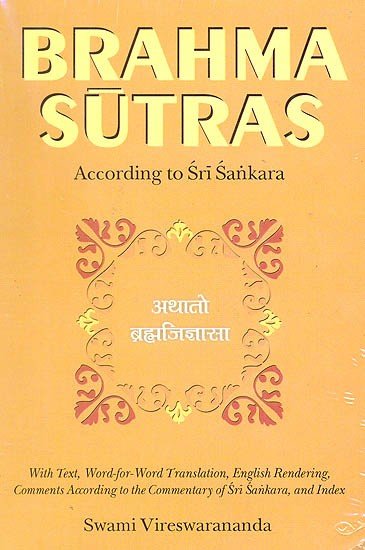Brahma Sutras (Shankara Bhashya)
by Swami Vireshwarananda | 1936 | 124,571 words | ISBN-10: 8175050063
This is the English translation of the Brahma-sutras including the commentary (Bhashya) of Shankara. The Brahma-sutra (or, Vedanta-sutra) is one of the three canonical texts of the Vedanta school of Hindu philosophy and represents an early exposition the Vedantic interpretation of the Upanishads. This edition has the original Sanskrit text, the r...
Chapter III, Section I, Adhikarana IV
Adhikarana summary: The soul in its descent from the moon does not become identified with ether etc. but attains similarity of nature
Brahma-Sutra 3.1.22: Sanskrit text and English translation.
तत्साभाव्यापत्तिः, उपपत्तेः ॥ २२ ॥
tatsābhāvyāpattiḥ, upapatteḥ || 22 ||
tat-sābhāvya-āpattiḥ—Attainment of a similarity of nature with them; upapatteḥ—being reasonable.
22. (The soul when descending from Chandraloka) attains similarity of nature with them (i.e. with ether, air, etc.), (that alone) being reasonable.
It has been said that the righteous who descend from the moon descend by the same path as they ascended by, but with some differences. “They return again that way as they came by, to the ether, from the ether to the air; the sacrificer having become air, becomes smoke,” etc. (Chh. 5. 10. 5). Now the question is whether the souls of such persons actually attain identity with ether, smoke, etc., or only attain a similar nature. The Sutra says that the souls do not attain identity with them, for it is impossible. A thing cannot become another of a different nature. What the text means, therefore, is that it attains similarity of nature—becomes like ether, air, etc. The soul assumes a subtle form like ether, comes under the influence of air and is connected with smoke, etc. Therefore similarity of nature and not identity is meant.
